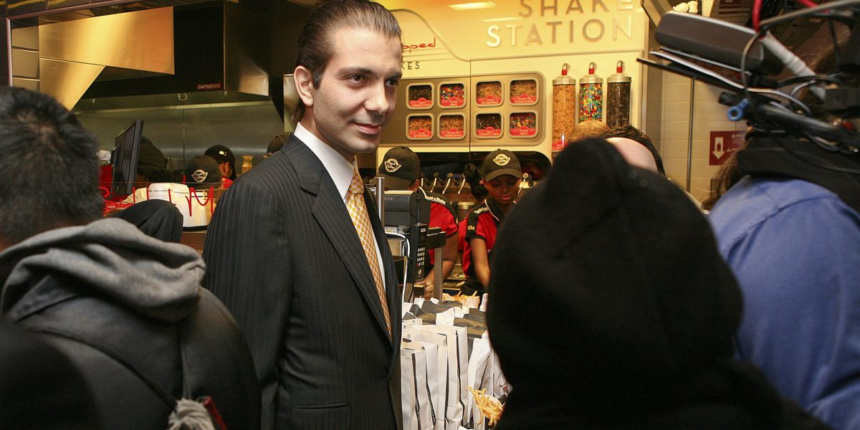Oddly, it also attracted the fury of fellow dining chain Steak ‘n Shake.
In a series of posts on X, Steak ‘n Shake’s official account issued calls for Cracker Barrel CEO Julie Felss Masino to be fired. It mocked the rebrand, and posted images of red MAGA-style hats that read “Fire Cracker Barrel CEO” and “Biglari was right about everything.”
A taste for conflict
“He’s whip smart. He’s very good at articulating his problems with corporate governance,” Jim Gillies, an analyst and advisor at the Motley Fool and longtime follower of Biglari, told Fortune. This ability to identify and address key operational issues, he said, has contributed to Biglari’s business wins.
Despite his confrontational reputation, Biglari notably avoids media coverage and has not in recent years participated in interviews. He declined to comment when reached by Fortune. Instead, the Iranian investor’s public relations modus operandi consists of strongly worded letters to shareholders, SEC filings, provocative online campaigns, and, most recently, memes.
Biglari’s vision for Steak ‘n Shake was to revitalize the ailing brand by implementing tighter cost controls, improved service, and a more entrepreneurial mindset. He sought to improve customer experience in the company’s 500 restaurants in 19 states by adding background music and removing harsh fluorescent lighting that he felt made guests feel uncomfortable.
The belly of Biglari Holdings
The investments made Biglari a wealthy man. But that wealth was generated by self-serving conflicts of interest, his critics say, and—ironically—it has hobbled his ability to move against Cracker Barrel.
When governance meets Goliath
This deal got Biglari listed in the “Corporate Governance Hall of Shame” by the investor publication 13D Monitor, according to a copy seen by Fortune.
“Coming up in the first few years when he was gaining recognition, he very much sang from that hymnal of we’re all going to make money together. And then once he was in a position to put his thumb on the scale, he did,” Gillies said.
“The type of activism he conducts doesn’t really enrich corporate governance. It ingratiates himself more with shareholders and was easier to get away with years ago,” Ken Squire, founder and president of 13D Monitor, told Fortune. “Now that activists have become much more responsible and much more mainstream, the ones who haven’t evolved are finding it harder to get anything done.”
Throughout Biglari’s numerous attempts to secure board seats at the chain, executives at Cracker Barrel have cited his executive compensation as proof of his ill intentions for the brand. Others have pointed to Biglari’s practice of hanging his portrait in every Steak ‘n Shake location and the chain’s own financial struggles.
The case against Cracker Barrel
Biglari was particularly critical of the company’s store-level deterioration. In one analysis, he compared Cracker Barrel’s operating income of $164.9 million with 357 stores in fiscal 1998 ($462,000 per store) to 2012’s operating income of $181.3 million with 616 stores (only $294,000 per store). This declining per-unit profitability became a central theme in his critiques and proxy battles.
A Cracker Barrel spokesperson defended the chain’s decision to raise its executive compensation packages, telling Fortune, “For the last several years the company has directly engaged with many of its largest shareholders to discuss a variety of topics, including executive compensation, and no shareholder ever expressed any disagreement or concern with the company’s executive compensation plans or practices. More broadly, Cracker Barrel’s shareholders have evidenced their support for the company’s executive compensation plans and practices by voting in favor of the company’s say-on-pay proposals each year by significant margins.”
“Through his campaigns, Mr. Biglari has made numerous false and misleading claims about Cracker Barrel, its Board and management,” a Cracker Barrel spokesperson told Fortune. “We believe that Mr. Biglari’s unprecedented seven proxy solicitations against the Company in the past 14 years have been for purely self-interested reasons, and that his own actions and poor performance at Steak ‘n’ Shake and Western Sizzlin’ remain cautionary tales. We appreciate the support from our shareholders as they have consistently rejected his proposals and nominees by overwhelming margins each time.”
Biglari’s proxy battles stand as one of the longest and most contentious activist campaigns in restaurant industry history. Despite the defeats, his investment in Cracker Barrel has been extraordinarily profitable.
Biglari sold off much of his stake, beginning in 2020, and now controls less than 5% of Cracker Barrel. Yet his investment has generated nearly $1 billion in total gains through dividends, stock sales, and remaining holdings for Biglari.
“Cracker Barrel is painting Biglari as this short-term profiteer. It’s been 14 years. He’s still there,” Gillies said.









